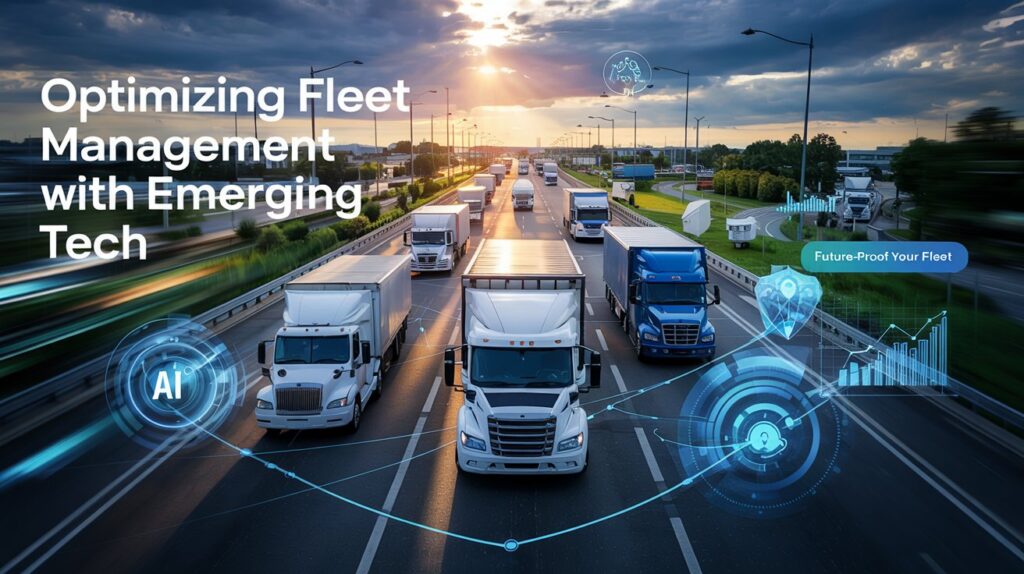Whether managing a handful of vehicles or a massive fleet, adopting advanced solutions like telematics, AI-driven analytics, and automation can streamline operations, reduce fuel consumption, and improve driver performance. Traditional fleet management relied heavily on manual tracking, paper logs, and reactive maintenance. Today, businesses leveraging digital innovations can predict potential failures, optimize routes in real time, and increase compliance with regulatory requirements. The integration of IoT, big data, and predictive analytics makes sure that fleet operations are no longer about simple vehicle tracking but about making data-driven decisions that maximize productivity.

Telematics and GPS Tracking Revolutionizing Fleet Visibility
Telematics and GPS tracking have become the backbone of modern fleet management, providing unparalleled visibility into vehicle locations, driver behavior, and route efficiency. With real-time GPS tracking, fleet managers can monitor every vehicle’s movement, making sure drivers adhere to assigned routes while minimizing fuel waste and delays. As highlighted in the blog post AI Trends in Fleet Management for 2025, telematics and GPS tracking have become the backbone of modern fleet management, providing unparalleled visibility into vehicle locations, driver behavior, and route efficiency. Businesses using these technologies can also automate reporting for compliance purposes, reducing the administrative burden.
AI-Powered Predictive Maintenance Enhancing Vehicle Longevity
Predictive maintenance, powered by artificial intelligence, is transforming fleet operations by preventing costly breakdowns and extending vehicle lifespan. AI-driven diagnostic tools analyze vast amounts of data from sensors installed in fleet vehicles, detecting early signs of mechanical issues before they escalate into major failures. Instead of relying on fixed maintenance schedules, predictive analytics enables fleet managers to conduct repairs precisely when needed, reducing unnecessary downtime and expenses. Real-time alerts notify operators of engine faults, transmission issues, or declining battery health, allowing for immediate action. By adopting predictive maintenance solutions, fleets can lower repair costs, reduce vehicle downtime, and improve overall reliability.
IoT and Automation Streamlining Fleet Operations
IoT-enabled devices track engine performance, tire pressure, fuel levels, and environmental conditions, providing real-time data that increases decision-making. Automated systems analyze this data to suggest optimal driving speeds, fuel-saving routes, and vehicle load distribution, improving efficiency. Automated fleet management software eliminates manual paperwork by generating digital reports, invoices, and compliance documentation. Fleet automation also extends to driver assignment and scheduling, reducing the workload for managers and ensuring resources are allocated efficiently. The ability to automate critical processes not only minimizes human error but also accelerates decision-making, helping fleets operate with maximum precision and productivity.
Advanced Data Analytics for Smarter Decision-Making
Modern fleet management software collects and processes vast amounts of information, including fuel consumption patterns, driver performance metrics, and vehicle maintenance history. By analyzing this data, fleet operators can identify trends, optimize fuel usage, and improve vehicle utilization rates. Advanced analytics also assists in demand forecasting, helping businesses adjust their fleet size based on seasonal fluctuations or market conditions. With real-time analytics, managers can spot inefficiencies and implement corrective measures immediately rather than reacting to problems after they arise. Data-driven decision-making not only increases fleet performance but also improves cost management, making sure businesses remain competitive in an increasingly digital landscape.
The Impact of Cloud Computing on Fleet Management Efficiency
With cloud-based fleet management systems, managers can monitor their fleets from anywhere, allowing for greater flexibility and quicker decision-making. These systems store vast amounts of data securely and can be accessed via any device with internet connectivity, eliminating the need for on-site servers or hardware. This level of accessibility increases operational agility, as managers can update schedules, track vehicles, and analyze performance data remotely. Cloud solutions often come with scalable features, allowing businesses to expand their fleet management capabilities as their operations grow without the need for significant infrastructure investments.
Electrification and Sustainable Fleet Solutions
The adoption of EVs in fleets is accelerating, driven by advancements in battery technology, lower operating costs, and government incentives for green initiatives. Fleet managers leveraging EVs benefit from reduced fuel expenses, lower maintenance requirements, and compliance with stringent environmental regulations. Charging infrastructure is also evolving, with smart charging stations enabling optimized energy consumption and fleet-wide energy management. Hydrogen fuel cell technology is emerging as a viable alternative for long-haul transportation, offering zero emissions with extended range capabilities. The shift toward electrification and sustainable practices makes sure that fleets operate more efficiently while aligning with global environmental goals.

Emerging technologies are reshaping fleet management by improving efficiency, reducing operational costs, and increasing sustainability. Telematics and GPS tracking provide real-time visibility, AI-driven predictive maintenance prevents costly breakdowns, and IoT-powered automation streamlines operations. Advanced analytics enables smarter decision-making, while the shift toward electrification and sustainable fleet solutions secures long-term environmental benefits. Businesses that embrace these technologies can optimize fleet performance, improve safety, and stay competitive in an evolving industry. By investing in innovation, fleet managers can future-proof their operations, reduce risks, and maximize profitability in an increasingly digital world.

